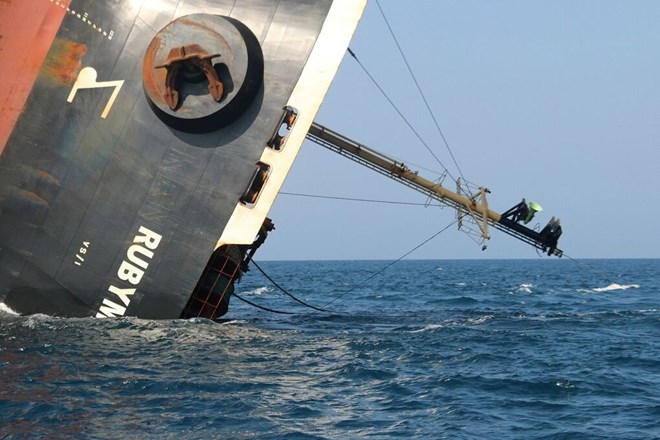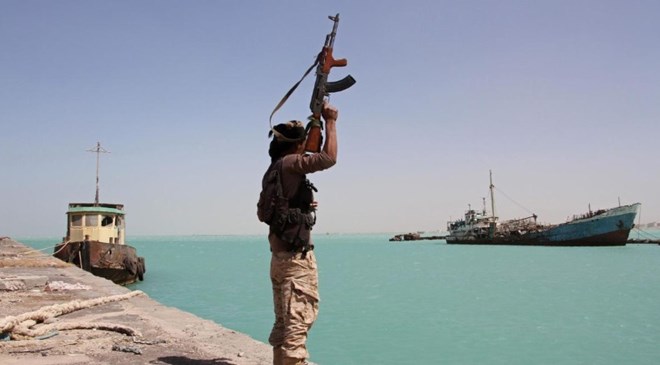
Monday November 11, 2024
Maritime lawyer Stephen Askins has cast doubt on claims that Yemen's Houthi rebels are raking in as much as $180 million monthly from shipping companies to ensure safe passage through the Red Sea, calling the figures in a recent UN report "unlikely" and logistically challenging.

The Rubymar ship submerged in the Red Sea on March 7, five days after it began sinking. It was hit by a Houthi missile earlier in February. Photographer: Khaled Ziad/AFP via Getty Images
Mogadishu (HOL) — Reports that Yemeni Houthis are allegedly pocketing $180 million monthly from shipping companies seeking safe passage through the Red Sea may be overblown, according to maritime lawyer Stephen Askins of Tatham & Co. The UN report suggests these payments flow through informal channels to Houthi leaders, but Askins is skeptical, questioning the feasibility and logistics of such large-scale bribes.
"It's a busy week for headlines," Askins began. "Putting aside the fake news that the Houthis had surrendered in the wake of Trump's election, the story that caught my eye arose from the latest UN Panel Experts on Yemen that shipping was paying 'illegal transit fees' of US$180m per month to the Houthis." The UN Panel, established under Resolution 2140, has tracked Houthi activities and their trade networks, suggesting in this latest report that the shipping agents are paying hefty sums through the hawala network—a traditional and informal money-transfer system commonly used in regions with limited banking access. According to the panel, these funds flow through intermediaries connected to Houthi leaders across multiple jurisdictions, adding to the Houthis' financial arsenal as they escalate threats to regional shipping.
The UN report, while unverified, has sent ripples through the international shipping community, spotlighting the mounting challenges of Red Sea security.
"This is a world I operate in," said Askins, who has extensive experience with cases involving piracy ransoms, ship detentions, and hostage negotiations. "$180 million per month is a big claim. This is close to what the industry paid in one year to Somali pirates during the height of that crisis. That was done legally with the backing of the insurance industry."
The UN report states (at para 113) that shipping agencies allegedly pay funds to secure transit through a company linked to a "top-ranking Houthi leader," with money deposited into various accounts across multiple jurisdictions via the Hawala system. The report adds that the Houthis are not acting alone. A network of regional alliances, including links with Iran's Revolutionary Guard, Hezbollah, and groups like al-Qaida and al-Shabaab, allows the Houthis to exercise influence over strategic shipping lanes in the Red Sea. Intelligence indicates that this "unprecedented" network has bolstered the Houthis' capacity for financial and logistical coordination, intensifying the threat to global maritime trade.

Maritime security expert Stephen Askins, co-founder of Tatham & Co.Photo: Tatham & Co.
Reflecting on his experiences in the hawala system, Askins recalled: "In London paying small amounts is easy. In Athens I have stood in a basement internet cafe with two Somali teenagers making their first foray as hawala agents. But payments in the UK are monitored. I have moved serious amounts of cash to pay Somali and Nigerian pirates." He explained, "Cash is heavy, and it's bulky. US$10m in cash in US$100 bills weighs around 100kg. I know how difficult it is from a legal, regulatory, and logistical point of view." According to Askins, regular transactions on the scale described by the UN report would attract attention, if not outright interdiction.
While Askins acknowledges the mounting security risks, he finds the UN's monthly figure questionable. "If anything like this sort of money was being paid by mainstream shipping, I would know," he said. "Shipowners are making tough choices about whether to route their vessels through or around the Red Sea, which leads to real costs. But suggesting they'd pay $180 million monthly to a proscribed group, without insurance recovery options, doesn't align with what I see in the industry."
Strategically positioned, the Red Sea is a critical maritime corridor, with vessels navigating between the Mediterranean, Indian Ocean, and beyond. The Houthis' alleged extortion tactics are raising significant security concerns for international shipping, with some companies reportedly opting to reroute their vessels around the Cape of Good Hope, adding days to their journey and increasing costs. For those still using the Red Sea, the prospect of paying bribes is an escalating concern.
"Shipowners are making choices about not going and the costs are passed on. Some are finding they have ships idle because they won't go through and are losing charters, and that is costing them serious money," Askins observed. But he questioned whether these disruptions alone could drive companies to engage with a proscribed organization like the Houthis, particularly given the potential for penalties and lack of insurance recovery.
"I don't buy it."
Despite Askins' skepticism, the UN report claims the Houthis' extortion network is both extensive and well-organized. Meanwhile, officials in Washington are also closely monitoring an alleged burgeoning Houthi-al-Shabaab collaboration. Although direct evidence remains elusive, the alliance would align with Iran's pattern of using proxy groups to counter Western influence in the region.

The Houthis’ ongoing asymmetric maritime insurgent tactics threaten security in the southern Red Sea. Photo Credit: AFP